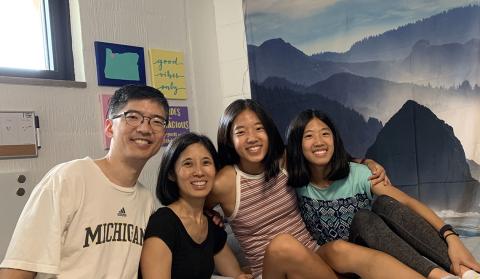New NEI Director Speaks with FAPAC

Last July, NIH director Dr. Francis Collins named Dr. Michael F. Chiang as new director of the National Eye Institute. The Federal Asian Pacific American Council (FAPAC) NIH chapter recently had the opportunity to speak with Chiang about his career development, work-life balance and the unique challenges for the Asian American, Native Hawaiian and Pacific Islander (AANHPI) community.
Chiang’s career as a clinician-scientist began at Harvard Medical School, where he was originally interested in computational neuroscience and wanted to become a neurosurgeon. After 3 years of research focused on visual science in the lab of Dr. Richard Masland, he decided to focus on the intersection between technology, vision science and ophthalmology.
After training, he began to work at Columbia University, where he applied information technology to vision research and vision care. With the support from three mentors with expertise in ophthalmology, biomedical informatics and telemedicine research, Chiang initiated his innovative work to design and build a telemedicine system for diagnosis for ROP (retinopathy of prematurity). This led to the implementation of telemedicine as part of standard ROP care in pediatric ophthalmology.
In spite of the intense research, he was passionately engaged in teaching and mentoring, which involved a lot of one-on-one sessions with students and residents. In 2010, Chiang was recruited to Oregon Health Science University’s Casey Eye Institute. In building the ROP program, Chiang led the team and mentored a large group of research fellows, graduate students and clinical trainees.
More recently, he has started working on ROP with artificial intelligence, along with bioinformatics analysis, as well as data science. He predicts that knowledge discovery in the medical world will be significantly advanced by big data and analyses.
From his personal development, Chiang recognized that traditional Asian culture poses limitations in speaking up, which may be a unique challenge for AANHPI. He has learned through his career about the importance of effective communication of ideas, particularly in science, as more collaboration is required.
Throughout his career, Chiang has treasured the support of his family, particularly his wife Lydia, who is a pediatrician. He has a very active family, as his two daughters have always been involved in sports and the whole family enjoys skiing in winter. During the ongoing pandemic, due to quarantine at home, Chiang and his family have been enjoying movies together.
For the full interview, visit https://www.fapac.org/resources/Documents/NIH%20Chapter/FAPAC%20Headlines%202020%20Winter%20Edition.pdf.—Catherine Yu, Xinzhi Zhang
